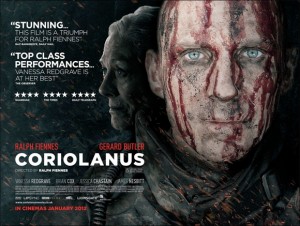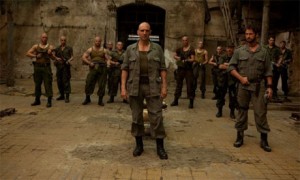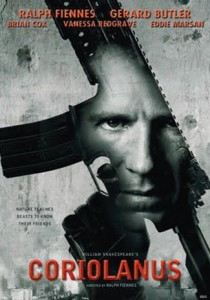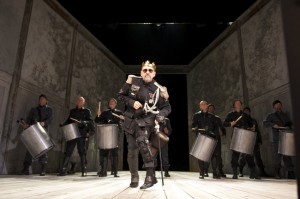He’s a hard guy to look at close up. Ralph Fiennes’s presentation of Caius Marcius Coriolanus hits with murderous intensity. He is, as his make-up artists worked hard to show us, a “thing of blood.”
Transposing the Roman Republic to a faux-Bosnian contemporary warzone works surprisingly well, with the scruffy citizens as a rebelious mob, the Tribunes as Party Bosses, and Coriolanus and his fellow aristocrats as well-dressed generals in battle fatigues and bespoke suits.

Much of the film, esp. the early scenes in Corioles, is close-up action following the hero as warrior, heavily burdened by 21st-century battle gear, but still fighting intimate, hand to hand battles. When he comes out of the mortal gates of the city, alone and covered with blood, it’s easy to see why he carried the day.
 Fiennes is brilliant, and his movie-star face beneath make-up scarring and lots of blood communicates both Coriolanus’s powerful public inhibitions — the general seems physically unable to play to the crowd — and also his over-powerful heroic charisma. He cannot be consul, he must be consul — and then suddenly he’s not.
Fiennes is brilliant, and his movie-star face beneath make-up scarring and lots of blood communicates both Coriolanus’s powerful public inhibitions — the general seems physically unable to play to the crowd — and also his over-powerful heroic charisma. He cannot be consul, he must be consul — and then suddenly he’s not.
The other performance that resonated was Vanessa Redgrave as Volumnia. I’m not sure she hit the final confrontation as powerfully as she might have — the famous pause, “holds her by the hand, silent,” wasn’t quite as wrenching as it might have been — but in the early scenes her palpable combination of pride, blood-lust, and maternal intimacy was gorgeous and hard to watch. “He is wounded,” she said with a sly smile that you almost felt you weren’t supposed to see, “I thank the gods for it.” The production cut my favorite over the top line about the breasts of Hecuba and Hector’s Achilles-split skull, but the wolf mother’s brutal pride and terrible grip on her son was wonderfully visual.
But the hero’s isolation was the main visual point. He was a general with no allies, no connection to family or country or troops. Even the love-fight with Aufidius was never, in this version, an attraction of near equals, but instead a lonely dragon’s futile attempt to find someone in the world as violent as powerful as him.
I saw a little trace of Voldemort only once, in the film’s final moments when, after Coriolanus has betrayed his Volscian allies and saved Rome, Aufidius’s men murder the Roman on a deserted road. The hero opens his moth spits his final words like the Dark Lord taunting Harry —
Alone I did it. Boy!










